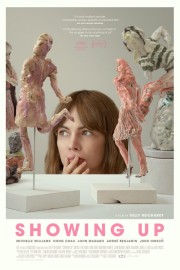Showing Up
Seen at the 2023 Atlanta Film Festival.
The films I’ve seen of Kelly Reichardt’s I’ve admired, but haven’t necessarily had strong feelings for. To a certain extent, “Showing Up” feels the same way, but this one connected with me stronger, because it’s central ideas feel well-observed, and indeed, connect with me more than those in other films I’ve seen. In “Showing Up,” a lot of the drama occurring in Lizzy’s life is because people feel at a distance to her than she does to them. That can be a painful feeling, when you feel like you’re in a one-sided relationship with someone. That can sometimes include your art, which feels to be the case as Lizzy gets ready for a show of her work.
Lizzy and Jo’s “friendship” is at the center of the film. Lizzy (Michelle Williams) is a ceramics sculptor who works with her mother (Maryann Plunkett) at an art school; she took up sculpting like her father (Judd Hirsch), who made pots. Lizzy focuses on characters, and people have great admiration for her attention to detail, and use of color. Jo (Hong Chau) was a student at the school, and is Lizzy’s landlord, as well. Jo has a show to prepare for, as well, so she is inattentive to things like the fact that Lizzy has not hot water; she’ll get to it, but it’ll have to wait until after her show. Even a pigeon that Jo seems to take care of when it appears in her yard with a broken wing seems to become Lizzy’s responsibility more than Jo’s- of course, what Jo doesn’t realize is that Lizzy found it first, and kept her cat from tearing it to pieces, so she welcomes it. Still, as the shows get closer, the tension seems to increase between the two.
One of the things you see that differentiates Lizzy and Jo is their ability to connect with others personally- Lizzy is more introverted but will be there for people (or birds), while Jo is more extroverted but isn’t really available on a personal level. That dynamic isn’t presented as a traditional protagonist/antagonist relationship, but simply something that results in a disconnect between these two women. Their art is a reflection of this, and I love the way that Williams and Chau play these characters; you can feel the friendship, but you can always sense they look at the responsibilities of a friendship as different. It’s interesting that, in this week, you can feel more friendship and empathy towards Lizzy from the kiln operator at the school, Eric (André Benjamin), than you can Jo; that might be because his contribution to the process is important for Lizzy’s work to be its best, and when something happens, it can ruin everything. Even family feels like a minefield with Lizzy, whether it’s her administrator mother, her father- who seems to have basic strangers living with him- or her unbalanced brother. Everything comes down to the final art show of Lizzy’s work, and it’s an event that threatens to undo her work that seems to break the tension all around. It’s a beautiful moment, and one of the reasons why “Showing Up” has lingered longer with me than my other experiences with Reichardt’s work.










